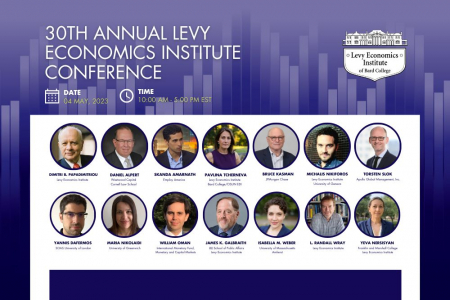Filter by
3527 results found
-
Event
Patriarchy and Women’s Economic Empowerment
A workshop organized by the Levy Economics Institute of Bard College and Department of Economics, University of Ghana Venue: Cedi Conference Centre, University of Ghana, Accra Date: October 10, 2022...more Event -
Event
What is a Feminist Quantitative Method? Opportunities for Feminist Econometrics
Join us for our third session with Sarah Small, Assistant Professor of Economics at the University of Utah, on Monday, March 4, from 5pm to 6pm in the Levy Conference Room, or...more Event -
Event
16th Annual Hyman P. Minsky Conference: Global Imbalances Prospects for the U.S. and World Economies
Levy Economics Institute of Bard College Annandale-on-Hudson, New York April 19–20, 2007 The 2007 Hyman P. Minsky Conference drew upon public discussions on the United States and world economies in...more Event -
Event
The Hyman P. Minsky Summer Seminar
Organized by the Levy Economics Institute of Bard College with support from the Ford Foundation Levy Institute Blithewood Annandale-on-Hudson, New York June 18–26, 2011 The Levy Economics Institute...more Event -
Event
Minsky: Global Financial Fragility and the Development of Capitalist Finance,Tianjin, China
A conference organized by the Levy Economics Institute of Bard College, The Institute of Economics of Nankai University (NKIE), and The Center for Political Economics Studies of Nankai University Tianjin,...more Event -
Event
The Eurozone Crisis, Greece, and the Experience of Austerity,Athens, Greece
Organized by the Levy Economics Institute of Bard College with support from the Ford Foundation November 8–9, 2013 Megaron Athens International Conference Centre This conference was organized as part of...more Event -
Event
Jan A. Kregel Festschrift Conference
Blithewood Annandale-on-Hudson, New York October 23, 2014 Jan A. Kregel’s multifaceted research agenda has included macroeconomic theory and policy, methodology, growth and capital theory, unemployment, development and trade, uncertainty, formulation...more Event -
Event
The Hyman P. Minsky Summer Seminar
Organized by the Levy Economics Institute of Bard College with support from the Ford Foundation Levy Institute Blithewood Annandale-on-Hudson, New York June 10–18, 2016 The seventh Minsky Summer...more Event -
Event
The Hyman P. Minsky Summer Seminar
Levy Economics Institute of Bard College Blithewood Annandale-on-Hudson, N.Y. June 17–23, 2018 The Levy Economics Institute of Bard College hosted the ninth Minsky Summer Seminar from June 17–23, 2018. The...more Event -
Event
Intensive Course in Gender-Sensitive Macroeconomic Modeling for Policy Analysis
July 8–14, 2020 Blithewood Annandale-on-Hudson, NY Update, April 21, 2020 We regret to inform the applicants that we have decided to postpone the course until July 2021. We are forced...more Event -
 Event
Event30th Annual Levy Economics Institute Conference
The 30th Annual Levy Economics Institute Conference was a one-day, virtual event organized around the topics of climate change and fiscal/monetary policy, inflation, unemployment and job creation, and the US macroeconomic...more Event -
Event
Critiquing from the Margins: Examining the Power of Black Girls™ Critiques of Class-Based Disparities in Schools
Join us for our fourth session with Jomaira Salas Pujols, Assistant Professor of Sociology at Bard College, on Thursday, March 28, from 5pm to 6pm in the Levy Conference Room, or on...more Event -
Event
17th Annual Hyman P. Minsky Conference: Credit, Markets, and the Real Economy Is the Financial System Working?
Levy Economics Institute of Bard College Annandale-on-Hudson, New York April 17–18, 2008 The focus of this year’s conference was the current economic and financial crisis in the United States and...more Event -
Event
20th Annual Hyman P. Minsky Conference: Financial Reform and the Real Economy
A conference organized by the Levy Economics Institute of Bard College with support from the Ford Foundation Ford Foundation New York City April 13–15, 2011 The 20th Annual Minsky Conference...more Event -
Event
The Hyman P. Minsky Summer Seminar
Organized by the Levy Economics Institute of Bard College with support from the Ford Foundation Levy Institute Blithewood Annandale-on-Hudson, New York June 14–22, 2013 The Levy Economics Institute of Bard...more Event -
Event
The Hyman P. Minsky Summer Seminar
Organized by the Levy Economics Institute of Bard College with support from the Ford Foundation Levy Institute Blithewood Annandale-on-Hudson, New York June 13–21, 2014 The fifth annual Minsky Summer Seminar...more Event -
Event
24th Annual Hyman P. Minsky Conference
Organized by the Levy Economics Institute of Bard College with support from the Ford Foundation The National Press Club Washington, D.C. April 15–16, 2015 The 2015 Minsky Conference addressed,...more Event -
Event
Re-embracing Keynes: Scholars, Admirers, and Skeptics in the Aftermath of the Crisis
Presented by the Bard College Economics Department and Economics Club, and the Levy Economics Institute Weis Cinema, Bard College October 6, 2015, 4:45 p.m. Cristina Marcuzzo is a full professor...more Event -
Event
27th Annual Hyman P. Minsky Conference
A conference organized by the Levy Economics Institute of Bard College Levy Economics Institute of Bard College Blithewood Annandale-on-Hudson, New York 12504 April 17–18, 2018 As the annual growth rate...more Event -
Event
The Legacy of Wynne Godley
He has been considered “the most insightful macroeconomic forecaster of his generation,” gaining this reputation through his research on the British economy during his time as head of Cambridge’s...more Event -
 Event
EventGender Equality and the Economy: Interdisciplinary Approaches
The Gender Equality and the Economy Program of the Levy Economics Institute hosts a speaker series with practitioners and scholars across disciplines from around the globe to address the ever-relevant...more Event -
Event
Free to Choose? The Gendered Impacts of Flexible Working Hours in Brazil
Join us for our sixth session with Lygia Sabbag Fares, Economics Professor at John Jay College (City University of New York - CUNY), on Monday, April 29, from 5pm to 6pm in the Levy Conference Room, or on Zoom. Event -
Event
18th Annual Hyman P. Minsky Conference: Meeting the Challenges of Financial Crisis
A conference organized by the Levy Economics Institute of Bard College with support from the Ford Foundation Ford Foundation New York City April 16–17, 2009 On April 16 and 17,...more Event -
Event
International Comparisons in Economic Well-Being among Advanced Industrialized Countries
Levy Economics Institute of Bard College Annandale-on-Hudson, New York December 2–3, 2010 The purpose of the workshop is to discuss the work on the Levy Institute Measure of Economic Well-Being...more Event


